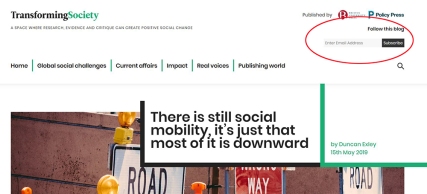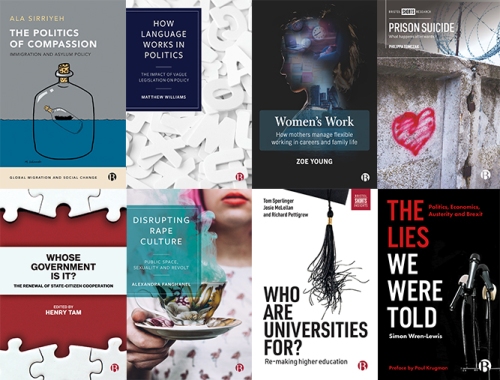It’s rare that there’s something positive to say about 2016, given the recent political upheaval, but we’re thankful that it has been a good year for Policy Press.

Alison Shaw
We celebrated 20 years, won an Independent Publishers Guild award and are about to host a high-profile Festival of Ideas event. Most significantly, October saw the announcement of the new University of Bristol Press, an exciting new venture in collaboration with the University of Bristol.
Here, Director Alison Shaw explains the developments, highlights key moments from 2016 and describes what they mean to her.
Creating the University of Bristol Press

The formation of University of Bristol Press (UBP) is the beginning of an exciting new era. When I created Policy Press (PP) 20 years ago I never dreamed that we would have achieved so much. UBP represents a wonderful recognition of our team’s achievements, and an opportunity to take what we have learned into new disciplines.
With the creation of UBP we will be able to expand into new areas – economics, politics and international development, business and management and law – whilst continuing our commitment to high quality scholarship and author care. We will also be expanding our publishing in sociology, criminology and social geography under UBP, keeping the Policy Press imprint focused on social problems and social action.
“…new opportunities for our authors and their work.”
The world has changed dramatically since 1996. The world of scholarly research dissemination, teaching and learning especially has changed and, with UBP, we can help support the international academic community through these developments. Flexible formats, Open Access and digital developments are all roads we are travelling down, allowing us to offer new opportunities for our authors and their work.
We are delighted to be part of the thriving University Press sector here in the UK. I believe there is a resurgence in support for University Presses, both among scholars and educational institutions, as publishers from within the scholarly community working for the scholarly community. It is extremely important to me that we continue to operate as a not-for-profit press focused on this community and not shareholders.
The social mission at the heart of what we do

I was not shocked by Brexit or by the election of Donald Trump. I am afraid the work we publish led me to predict that both votes would happen. I believe that when people see their standard of living fall and no clear future ahead, they retract into their own communities and fear those that are ‘other’ than themselves. There are many other factors behind both votes, but the outcome is the that the ‘left behind’ in our globalised world have made their voices heard.
I am equally unsurprised by the continued lack of care for the most vulnerable in our society we saw with the announcements in last Wednesday’s autumn statement. The gap between rich and poor is ever growing and policy, unfortunately, continues to benefit the better off. In these cruel times of austerity and political turmoil, we will continue our ongoing commitment to social change through our publishing under the Policy Press imprint.
“I was not shocked by Brexit or by the election of Donald Trump.”
Making a difference and finding ways for research to reach an audience where it can help policy and practice to address social issues and improve individual’s lives has remained fundamental to the development of the business. Policy Press will keep its focus on these social action aspects where UBP will focus on the more traditional scholarly work across all the core social science disciplines.
Winning the IPG award

Winning the IPG Frankfurt Bookfair Independent Academic and Professional Publisher of the Year award was a turning point for Policy Press.
This recognition by our industry means so much to me, and to the team. It means that all the hard work over 20 years incrementally building a business from its tiny start was a goal worth pursuing.
It says ‘thank you’ to the amazing authors, editors and partners that we work with and without whom we could not have won the award. It also shows that the faith the University of Bristol has shown in us has been repaid a little.
Why we’re hosting ‘The Future of Social Justice’ event

On 5 December we are hosting ‘The future of social justice’ event in Bristol, with Melissa Benn, Danny Dorling, Kayleigh Garthwaite and Owen Jones speaking. It’s a huge privilege to bring together these speakers and the general public in a debate that I’m sure will present some hope for the future.
This will also be the final event in our 20 year celebrations and the official launch of University of Bristol Press by Professor Hugh Brady, University of Bristol Vice-Chancellor and President.
And the future?
I am optimistic about the future for publishing and fundamentally believe that if we continue to publish great quality books and journals well, University of Bristol Press and Policy Press will continue to go from strength to strength. We will be there to help researchers, teachers and professionals to get their work read and used.
“Every single book or journal article we publish educates and, in so doing, has the potential to change the world”
Over the next few years the team is going to grow significantly, with new staff from commissioning to marketing and sales. This will bring exciting new opportunities for creative collaboration and product development as we become stronger in our existing subject areas and emerge in those that are new. Policy Press, as an imprint, is now in a better place than ever to produce books that can really make a difference.
Every single book or journal article we publish educates and, in so doing, has the potential to change the world a tiny bit. That’s the beauty of publishing – particularly academic publishing – and of being a press dedicated to making a positive difference.
It’s in this that a more hopeful, socially just, future lies.
Keep up-to-date with developments at Policy Press/University of Bristol Press by signing up to our newsletter. You will also receive a code that gives you 35% off all our books when ordered at www.policypress.co.uk.

















